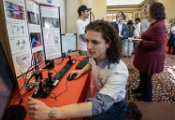QuEra Survey: Quantum Computing is Developing Faster Than Expected
August 6, 2024 -- New research from QuEra Computing, the leader in neutral-atom quantum computing, reveals that over half of quantum academics, scientists and professionals (51%) believe the technology is making faster progress than they expected, with 40% saying it will become a superior alternative to classical computing for certain workloads within the next five years. The findings also highlight the truly disruptive potential of the technology, with a majority expecting quantum computing to solve problems that were previously unsolvable.
QuEra’s research was published today in its ‘Current and future state of quantum computing’ report (see here) and was conducted on over 900 quantum computing academics, scientists and professionals across the globe. The positive outlook highlights the significant progress being made in solving the main barriers to quantum computing development and adoption, which QuEra’s research identified as scalability (33%), error correction and fault tolerance (31%), and hardware performance (20%).
However, participants do have concerns. A third (33%) believe it is likely their organization will be caught off guard by the rapid progress being made, while also being wary of a bottleneck similar to the one being experienced with AI. Due to the rapid growth of AI applications, there are widespread reports of difficulties in securing time on GPUs for their projects, and the majority (65%) of respondents are concerned a similar situation might occur with quantum computers once their value is proven and demand and competition for resources intensifies.
Yuval Boger, Chief Commercial Officer, QuEra, said: “Recent major breakthroughs have significantly accelerated quantum computing development and reduced the timescales for adoption. The first computer capable of achieving quantum advantage is slated to hit the market in 2026 and companies realize they will soon be in a race for first-mover advantage. We’ve seen a huge shift in companies moving from experimenting and educating their workforce, to preparing to capitalize the very minute quantum advantage computers hit the market.”
According to the survey, the US is in the pole position to lead the global quantum computing industry, with 82% of US participants believing it is very well positioned to play an important role. While only 42% of European participants share the same sentiment on their own countries, confidence is much higher in France (67%) and the UK (57%), while Germany is close to the average at 45%.
The question of where quantum computers are developed and manufactured has become increasingly important, as nations have recently enacted controls to limit the capabilities of quantum computers they export. Participants in the US and France, both at 34% of respondents, believe it important that the technology be developed in their own country, whereas 24% say the same in Germany and only 14% in the UK.
It is far more important to European Participants that the computers are made by a friendly trading partners, as 60% of UK participants agreed with this, as did those in Germany (54%) and France (49%), compared to 40% in the US.
For the research, QuEra surveyed 920 members of the quantum computing community, including academics, scientists and professionals worldwide in June 2024. There were 350 respondents based in Europe and 338 in the US[LA2] [MOU3] . Respondents were sourced from QuEra’s database of contacts via an email invitation and an online survey.




































